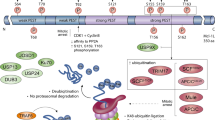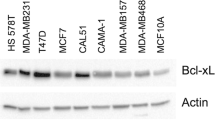Abstract
Transforming growth factor-β (TGFβ)-activated signalling pathways can lead to apoptosis, growth arrest or promotion of malignant behaviour, dependent on cellular context. The molecular mechanisms involved in TGFβ-induced apoptosis remain controversial; although changes in gene expression are thought to be pivotal to the process, several different candidate apoptotic initiators and mediators have been proposed. Smad4, a critical component of the TGFβ-induced transcriptional machinery, is shown here to be essential for induction of apoptosis. Gene expression analysis identified the proapoptotic Bcl-2 family members, Bmf and Bim, as induced by TGFβ, dependent on both Smad4 and p38 function and the generation of reactive oxygen species. TGFβ-induced Bmf and Bim localize to cellular membranes implicated in apoptosis. Inhibition of the TGFβ-induced expression of both these proteins together provides significant protection of cells from apoptosis. The TGFβ-triggered cell death programme thus involves induction of multiple BH3-only proteins during the induction of apoptosis.
This is a preview of subscription content, access via your institution
Access options
Subscribe to this journal
Receive 50 print issues and online access
$259.00 per year
only $5.18 per issue
Buy this article
- Purchase on Springer Link
- Instant access to full article PDF
Prices may be subject to local taxes which are calculated during checkout





Similar content being viewed by others
Accession codes
Accessions
GenBank/EMBL/DDBJ
References
Arsura M, Wu M, Sonenshein GE . (1996). TGF beta 1 inhibits NF-kappa B/Rel activity inducing apoptosis of B cells: transcriptional activation of I kappa B alpha. Immunity 5: 31–40.
Bakin AV, Stourman NV, Sekhar KR, Rinehart C, Yan X, Meredith MJ et al. (2005). Smad3-ATF3 signaling mediates TGF-beta suppression of genes encoding Phase II detoxifying proteins. Free Radic Biol Med 38: 375–387.
Chipuk JE, Bhat M, Hsing AY, Ma J, Danielpour D . (2001). Bcl-xL blocks transforming growth factor-beta 1-induced apoptosis by inhibiting cytochrome c release and not by directly antagonizing Apaf-1-dependent caspase activation in prostate epithelial cells. J Biol Chem 276: 26614–26621.
Conery AR, Cao Y, Thompson EA, Townsend Jr CM, Ko TC, Luo K . (2004). Akt interacts directly with Smad3 to regulate the sensitivity to TGF-beta induced apoptosis. Nat Cell Biol 6: 366–372.
Coyle B, Freathy C, Gant TW, Roberts RA, Cain K . (2003). Characterization of the transforming growth factor-beta 1-induced apoptotic transcriptome in FaO hepatoma cells. J Biol Chem 278: 5920–5928.
Derynck R, Zhang YE . (2003). Smad-dependent and Smad-independent pathways in TGF-beta family signalling. Nature 425: 577–584.
Dijkers PF, Medema RH, Lammers JW, Koenderman L, Coffer PJ . (2000). Expression of the pro-apoptotic Bcl-2 family member Bim is regulated by the forkhead transcription factor FKHR-L1. Curr Biol 10: 1201–1204.
Edlund S, Bu S, Schuster N, Aspenstrom P, Heuchel R, Heldin NE et al. (2003). Transforming growth factor-beta1 (TGF-beta)-induced apoptosis of prostate cancer cells involves Smad7-dependent activation of p38 by TGF-beta-activated kinase 1 and mitogen-activated protein kinase kinase 3. Mol Biol Cell 14: 529–544.
Francis JM, Heyworth CM, Spooncer E, Pierce A, Dexter TM, Whetton AD . (2000). Transforming growth factor-beta 1 induces apoptosis independently of p53 and selectively reduces expression of Bcl-2 in multipotent hematopoietic cells. J Biol Chem 275: 39137–39145.
Hahn SA, Schutte M, Hoque AT, Moskaluk CA, da Costa LT, Rozenblum E et al. (1996). DPC4, a candidate tumor suppressor gene at human chromosome 18q21.1. Science 271: 350–353.
Herrera B, Alvarez AM, Sanchez A, Fernandez M, Roncero C, Benito M et al. (2001a). Reactive oxygen species (ROS) mediates the mitochondrial-dependent apoptosis induced by transforming growth factor (beta) in fetal hepatocytes. FASEB J 15: 741–751.
Herrera B, Fernandez M, Alvarez AM, Roncero C, Benito M, Gil J et al. (2001b). Activation of caspases occurs downstream from radical oxygen species production, Bcl-xL down-regulation, and early cytochrome C release in apoptosis induced by transforming growth factor beta in rat fetal hepatocytes. Hepatology 34: 548–556.
Hishikawa K, Oemar BS, Tanner FC, Nakaki T, Luscher TF, Fujii T . (1999). Connective tissue growth factor induces apoptosis in human breast cancer cell line MCF-7. J Biol Chem 274: 37461–37466.
Inayat-Hussain SH, Couet C, Cohen GM, Cain K . (1997). Processing/activation of CPP32-like proteases is involved in transforming growth factor beta1-induced apoptosis in rat hepatocytes. Hepatology 25: 1516–1526.
Jang CW, Chen CH, Chen CC, Chen JY, Su YH, Chen RH . (2002). TGF-beta induces apoptosis through Smad-mediated expression of DAP-kinase. Nat Cell Biol 4: 51–58.
Kanamaru C, Yasuda H, Fujita T . (2002). Involvement of Smad proteins in TGF-beta and activin A-induced apoptosis and growth inhibition of liver cells. Hepatol Res 23: 211–219.
Kang Y, Chen CR, Massague J . (2003). A self-enabling TGFbeta response coupled to stress signaling: Smad engages stress response factor ATF3 for Id1 repression in epithelial cells. Mol Cell 11: 915–926.
Kaufmann T, Schlipf S, Sanz J, Neubert K, Stein R, Borner C . (2003). Characterization of the signal that directs Bcl-x(L), but not Bcl-2, to the mitochondrial outer membrane. J Cell Biol 160: 53–64.
Kayanoki Y, Fujii J, Suzuki K, Kawata S, Matsuzawa Y, Taniguchi N . (1994). Suppression of antioxidative enzyme expression by transforming growth factor-beta 1 in rat hepatocytes. J Biol Chem 269: 15488–15492.
Kim BC, Mamura M, Choi KS, Calabretta B, Kim SJ . (2002). Transforming growth factor beta 1 induces apoptosis through cleavage of BAD in a Smad3-dependent mechanism in FaO hepatoma cells. Mol Cell Biol 22: 1369–1378.
Kim SG, Jong HS, Kim TY, Lee JW, Kim NK, Hong SH et al. (2004). Transforming growth factor-beta 1 induces apoptosis through Fas ligand-independent activation of the Fas death pathway in human gastric SNU-620 carcinoma cells. Mol Biol Cell 15: 420–434.
Larisch S, Yi Y, Lotan R, Kerner H, Eimerl S, Tony Parks W et al. (2000). A novel mitochondrial septin-like protein, ARTS, mediates apoptosis dependent on its P-loop motif. Nat Cell Biol 2: 915–921.
Liao JH, Chen JS, Chai MQ, Zhao S, Song JG . (2001). The involvement of p38 MAPK in transforming growth factor beta1-induced apoptosis in murine hepatocytes. Cell Res 11: 89–94.
Liu JW, Chandra D, Rudd MD, Butler AP, Pallotta V, Brown D et al. (2005). Induction of prosurvival molecules by apoptotic stimuli: involvement of FOXO3a and ROS. Oncogene 24: 2020–2031.
Morgenstern JP, Land H . (1990). Advanced mammalian gene transfer: high titre retroviral vectors with multiple drug selection markers and a complementary helper-free packaging cell line. Nucleic Acids Res 18: 3587–3596.
Nass SJ, Li M, Amundadottir LT, Furth PA, Dickson RB . (1996). Role for Bcl-xL in the regulation of apoptosis by EGF and TGF beta 1 in c-myc overexpressing mammary epithelial cells. Biochem Biophys Res Commun 227: 248–256.
Ohgushi M, Kuroki S, Fukamachi H, O'Reilly LA, Kuida K, Strasser A et al. (2005). Transforming growth factor beta-dependent sequential activation of Smad, Bim, and caspase-9 mediates physiological apoptosis in gastric epithelial cells. Mol Cell Biol 25: 10017–10028.
Park HJ, Kim BC, Kim SJ, Choi KS . (2002). Role of MAP kinases and their cross-talk in TGF-beta1-induced apoptosis in FaO rat hepatoma cell line. Hepatology 35: 1360–1371.
Perlman R, Schiemann WP, Brooks MW, Lodish HF, Weinberg RA . (2001). TGF-beta-induced apoptosis is mediated by the adapter protein Daxx that facilitates JNK activation. Nat Cell Biol 3: 708–714.
Puthalakath H, Huang DC, O'Reilly LA, King SM, Strasser A . (1999). The proapoptotic activity of the Bcl-2 family member Bim is regulated by interaction with the dynein motor complex. Mol Cell 3: 287–296.
Puthalakath H, Villunger A, O'Reilly LA, Beaumont JG, Coultas L, Cheney RE et al. (2001). Bmf: a proapoptotic BH3-only protein regulated by interaction with the myosin V actin motor complex, activated by anoikis. Science 293: 1829–1832.
Remy I, Montmarquette A, Michnick SW . (2004). PKB/Akt modulates TGF-beta signaling through a direct interaction with Smad3. Nat Cell Biol 6: 358–365.
Saltzman A, Munro R, Searfoss G, Franks C, Jaye M, Ivashchenko Y . (1998). Transforming growth factor-beta-mediated apoptosis in the Ramos B-lymphoma cell line is accompanied by caspase activation and Bcl-XL downregulation. Exp Cell Res 242: 244–254.
Sanchez A, Alvarez AM, Benito M, Fabregat I . (1996). Apoptosis induced by transforming growth factor-beta in fetal hepatocyte primary cultures: involvement of reactive oxygen intermediates. J Biol Chem 271: 7416–7422.
Schiffer M, Mundel P, Shaw AS, Bottinger EP . (2004). A novel role for the adaptor molecule CD2-associated protein in transforming growth factor-beta-induced apoptosis. J Biol Chem 279: 37004–37012.
Schrantz N, Bourgeade MF, Mouhamad S, Leca G, Sharma S, Vazquez A . (2001). p38-mediated regulation of an Fas-associated death domain protein-independent pathway leading to caspase-8 activation during TGFbeta-induced apoptosis in human Burkitt lymphoma B cells BL41. Mol Biol Cell 12: 3139–3151.
Seoane J, Le HV, Shen L, Anderson SA, Massague J . (2004). Integration of Smad and forkhead pathways in the control of neuroepithelial and glioblastoma cell proliferation. Cell 117: 211–223.
Takekawa M, Tatebayashi K, Itoh F, Adachi M, Imai K, Saito H . (2002). Smad-dependent GADD45beta expression mediates delayed activation of p38 MAP kinase by TGF-beta. EMBO J 21: 6473–6482.
Tang TT, Dowbenko D, Jackson A, Toney L, Lewin DA, Dent AL et al. (2002). The forkhead transcription factor AFX activates apoptosis by induction of the BCL-6 transcriptional repressor. J Biol Chem 277: 14255–14265.
Teramoto T, Kiss A, Thorgeirsson SS . (1998). Induction of p53 and Bax during TGF-beta 1 initiated apoptosis in rat liver epithelial cells. Biochem Biophys Res Commun 251: 56–60.
Thannickal VJ, Fanburg BL . (1995). Activation of an H2O2-generating NADH oxidase in human lung fibroblasts by transforming growth factor beta 1. J Biol Chem 270: 30334–30338.
Valderrama-Carvajal H, Cocolakis E, Lacerte A, Lee EH, Krystal G, Ali S et al. (2002). Activin/TGF-beta induce apoptosis through Smad-dependent expression of the lipid phosphatase SHIP. Nat Cell Biol 4: 963–969.
Wakefield LM, Roberts AB . (2002). TGF-beta signaling: positive and negative effects on tumorigenesis. Curr Opin Genet Dev 12: 22–29.
Wildey GM, Patil S, Howe PH . (2003). Smad3 potentiates transforming growth factor beta (TGFbeta)-induced apoptosis and expression of the BH3-only protein Bim in WEHI 231 B lymphocytes. J Biol Chem 278: 18069–18077.
Yang YC, Piek E, Zavadil J, Liang D, Xie D, Heyer J et al. (2003). Hierarchical model of gene regulation by transforming growth factor beta. Proc Natl Acad Sci USA 100: 10269–10274.
Yoo J, Ghiassi M, Jirmanova L, Balliet AG, Hoffman B, Fornace Jr AJ et al. (2003). Transforming growth factor-beta-induced apoptosis is mediated by Smad-dependent expression of GADD45b through p38 activation. J Biol Chem 278: 43001–43007.
Yu L, Hebert MC, Zhang YE . (2002). TGF-beta receptor-activated p38 MAP kinase mediates Smad-independent TGF-beta responses. EMBO J 21: 3749–3759.
Acknowledgements
We would like to thank Yvonne Hey at the Paterson Institute for performing the Affymetrix Microarray analysis. We would also like to thank David Huang, Lorraine O'Reilly and Andreas Strasser for Bmf antibody, as well as members of the Downward laboratory for helpful discussions and advice. This work was funded by Cancer Research UK.
Author information
Authors and Affiliations
Corresponding author
Additional information
Supplementary Information accompanies the paper on the Oncogene website (http://www.nature.com/onc).
Supplementary information
Rights and permissions
About this article
Cite this article
Ramjaun, A., Tomlinson, S., Eddaoudi, A. et al. Upregulation of two BH3-only proteins, Bmf and Bim, during TGFβ-induced apoptosis. Oncogene 26, 970–981 (2007). https://doi.org/10.1038/sj.onc.1209852
Received:
Revised:
Accepted:
Published:
Issue Date:
DOI: https://doi.org/10.1038/sj.onc.1209852
Keywords
This article is cited by
-
Transcriptional signatures of the BCL2 family for individualized acute myeloid leukaemia treatment
Genome Medicine (2022)
-
Molecular mechanisms detected in yak lung tissue via transcriptome-wide analysis provide insights into adaptation to high altitudes
Scientific Reports (2021)
-
RGS5–TGFβ–Smad2/3 axis switches pro- to anti-apoptotic signaling in tumor-residing pericytes, assisting tumor growth
Cell Death & Differentiation (2021)
-
Targeting TGFβ signal transduction for cancer therapy
Signal Transduction and Targeted Therapy (2021)
-
Salt-inducible kinases (SIKs) regulate TGFβ-mediated transcriptional and apoptotic responses
Cell Death & Disease (2020)



